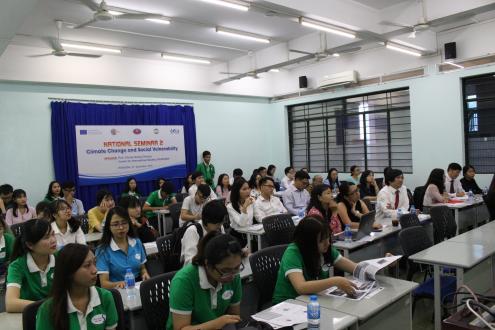In the framework of the REACT dissemination plan, the National Seminar #2 organized at Ho Chi Minh City University of Social Sciences and Humanities - Vietnam National University, aimed to:
- Providing REACT staff, academics of PC HEIs, private sector, research institutes and students at national level general information about environmental and socio-economic impacts of climate change as well as current challenges on community livelihoods in Viet Nam’s Mekong delta. The trends of climate change in the East and West regions along Mekong River, mitigation and adaptation of the two communities and economic activities based on river in the Mekong Delta and Tonlé Sap were presented in particular.
- Discussing on solutions for climate change in Viet Nam’s Mekong delta, including the chances for survival and preserve the livelihood of the riverine community of the Mekong Delta in the context of the disappearance of economic activities based on river.
- Raising the concern of stakeholders and fostering the international collaboration on developing further studies related to social vulnerability to climate change.
The seminar attracted distinguished participants included experts working at Binh Phuoc Department of Natural Resources and Environment, Ca Mau Department of Science and Technology, HCMC Institute of Natural Resources and Geography, Hue University of Agriculture and Forestry together with the presence of lecturers, researchers, postgraduate students and students from Faculty of Sociology and Faculty of Urban Studies (University of Social Sciences and Humanities), HCMC Open University, Da Lat University, Da Nang University, Van Hien University, Southern Institute of Social Sciences.
Prof. Dr. Chung Hoang Chuong, presenter of the seminar, successfully delivered useful information related to climate change and vulnerability of communities in Mekong River Delta. According to the presentation, with the change of river system from upstream, economic activities in Mekong Delta in general and Tonlé Sap in particular are also severe affected and at risk of gradually disappearing. The urgent solutions should be conducted to access such problem. During the seminar, participant also had chances to pose their opinion about the current mitigation and adaptation in agricultural activities in the Mekong Delta. They learnt the difference on climate change adaptation between lowland, mountainous and coastal areas, especially in terms of livelihood adaptation.

